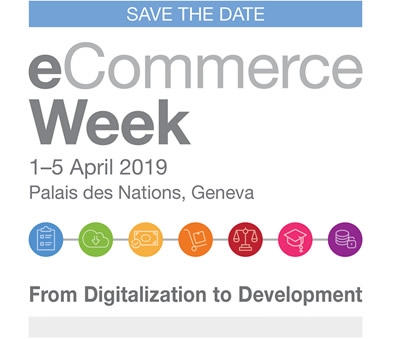How can e-commerce, international trade, and data flows contribute to development
2 Apr 2019 10:00h - 11:30h
Event report
[Read more session reports and live updates from the UNCTAD E-commerce Week]
The session was moderated by Mr Richard Hill (Consultant Association for Proper Internet Governance). He said that the panellists will treat the economic aspects of data flows. In addition, he introduced the e-commerce proposals and explained the impacts regarding human rights, including labour rights, and the SDGs. He pointed out opportunities for African structural transformation with regard to e-commerce.
Mr J. S. Deepak (Ambassador and Permanent Representative Permanent Mission of India to the WTO) explained that the e-commerce business is a game-changer for the developing countries. However, those countries must take advantage of the digital economy. He talked about the outcomes of the eleventh Ministerial Conference (MC11) in Buenos Aires on e-commerce. Moreover, he said that the developing countries have to be prepared in information and communication technology (ICT) infrastructure, digital skills, and connectivity. Deepak noted the role of digital literacy. He asked some questions: Do we have policy that aids e-commerce? How can we protect the domestic industry? How can we protect our companies? Furthermore, he said that the game is now played by the big companies like Amazon, Google, and Facebook. He noted how the least-developed countries (LDCs) are still struggling for e-transaction and e-payment facilities. According to him, India has made decisions in domestic regulation that will help to preserve the local industries. He highlighted the importance of GATS for developing countries like India to provide the connectivity, e-services to the citizens and data protection. He concluded by adding that e-commerce has huge advantages for economic development, but there must be change in how we think about the digital economy. The developing countries have to work together in tackling e-commerce challenges.
Ms Deborah James (Director of International Programs Center for Economic and Policy Research (CEPR)) explained the difference between digital trade and digital trade rules. She said that there is already a mandate for development in the WTO that is getting pushed aside for e-commerce. According to her, tax implications are central to the e-commerce model. She mentioned the link between tax implications for jobs and development. Moreover, she added that if the companies cheat on the taxes, it becomes difficult for developing countries to benefit from e-commerce. She continued to discuss data and development: in particular, control over data and cross-border data transfers. According to her, we have to talk about the economic regimes of data. She gave the example of how Tesla, a big company, treats data. She added that negotiations on data issues must focus on how they can help accomplish inclusive trade and digital industrialisation. Finally, she highlighted some solutions like co-operation between private sectors and public institutions.
Ms Vahini Naidu (Economic Counsellor, South African Permanent Mission to the WTO) explained that discussions on e-commerce are very active in the WTO. However, she noted that it is challenging to mobilise ministerial officials in e-commerce negotiations. She said that in the African context, developing countries are still struggling with digital infrastructure and digital transformation. She mentioned the role of the African Continental Free Trade Area (AfCFTA) and its impact on the ‘data revolution’ in African countries. Furthermore, Naidu emphasised the increase of digital awareness and digital industrial policy. However, she added that there is still a digital divide among the WTO members. She noted the importance of connectivity in economic development, addressing regulation policies, competition, taxation, and digitalisation of manufacturing. According to her, we need to understand the big image of data flows for developing countries. Finally, she said that the global rules on e-commerce could be premature for the African countries and developing countries.
Mr Abhijit Das (Head, Centre for WTO Studies, Centre of WTO Studies) explained data as raw material and market concentration. He talked about how the GATT rules regulate natural resources. According to him, most countries have not regulated export taxes. He said that there is use of Internet as a medium of delivery and of generating and gathering data. He also noted the considerable evidence on anti-competitive practices by digital giants. Das said that findings of the EC Competition Authority influence how data is used in digital trade. According to him, the developing countries must be prepared and join the e-commerce negotiations. He added that it will be the tool that influences the future of digital trade. He concluded with the thought that ‘if you don’t join the train, you will left behind’.
Ms Sanya Reid Smith (Legal Advisor and Senior Researcher, Third World Network, Geneva) started by explaining that if we don’t have e-commerce rules, the game will still be the same in international trade. She said that we have to pay attention to how WTO members can regulate the e-commerce issue. According to her, in the WTO, there are discussions on cross-border data and restrictions on data localisation. However, the vision and regional regulations on the data issue face various challenges. She pointed to achieving a legitimate public policy objective and to unjustifiable discrimination or to a disguised restriction on trade. In addition, Reid Smith said that the EU strongly protects data localisation. She added that using the GATS privacy exception is not easy for some developing WTO members. She talked about raising de minimis, current national regulations on data localisation and protection. Finally, she mentioned the important role of small and medium-sized enterprises (SMEs) in dealing with the data issue.
By Gilles D. Bana
Related topics
Related event

eCommerce Week 2019: From Digitalization to Development
1 Apr 2019 15:45h - 5 Apr 2019 15:45h
Geneva, Switzerland
